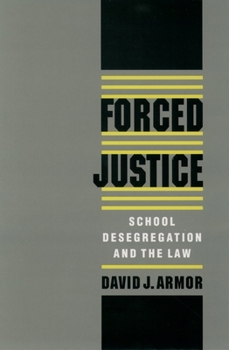Forced Justice: School Desegregation and the Law
Select Format
Select Condition 
Book Overview
School desegregation and "forced" busing first brought people to the barricades during the 1960s and 1970s, and the idea continues to spark controversy today whenever it is proposed. A quiet rage smolders in hundreds of public school systems, where court- ordered busing plans have been in place for over twenty years. Intended to remedy the social and educational disadvantages of minorities, desegregation policy has not produced any appreciable educational...
Format:Paperback
Language:English
ISBN:0195111354
ISBN13:9780195111354
Release Date:October 1996
Publisher:Oxford University Press
Length:288 Pages
Weight:0.95 lbs.
Dimensions:0.8" x 6.0" x 9.2"
Related Subjects
American Literature Civil Rights Civil Rights & Liberties Classics Constitutional Law Discrimination Discrimination & Racism Economic History Economics Education & Reference Law Literature Political Science Politics & Government Politics & Social Sciences Race Relations Social Science Social Sciences Specific TopicsCustomer Reviews
1 rating
Forced desegregation: noble idea, huge effort, mixed results
Published by Thriftbooks.com User , 21 years ago
This is a comparison of two books with different points of view, one from the heart and one from the head. Tom Wicker's thesis in "Tragic Failure" subtitle "Racial Integration in America" is that racial integration simply has not worked. He would support the William O. Douglas / Thurgood Marshall line of thought that the job of integration will only be complete when most neighborhoods and schools are visibly multi-racial and all races enjoy substantially equal prestige and incomes. He would argue that government, especially the courts, have much more work to do.Wicker's apologia for persistent educational and economic underperformance he roots in two centuries of slavery and another of Jim Crow. He sees a vicious cycle of undereducation, low self esteem, illegitimacy and drug dependency that will apparently perpetuate itself until it is broken by the acceptance of minorities as equal citizens, that to be achieved by force of law. Both authors observe that the courts went from one extreme, the "separate but equal" doctrine of Plessy vs. Ferguson. to a middle ground with "Brown vs. Board of Education," to the highly interventionist phase of forced busing in the 1970s, to return to a rather muddled middle ground in the 1990's, with mandatory busing being phased out and increased tolerance of de facto segregation resulting from residential patterns.David J. Armor served as an expert witness in many school desegregation cases, including those involving forced busing. "Forced Justice" offers the legal history of school desegregation, an analysis of the "harm and benefits" theory behind integration, an assessment of the extent to which desegregation yielded the expected benefits, and a snapshot of the status quo as of his writing in 1995, forty some years after Brown vs. Board of Education.Though court decisions drove the most divisive aspects of school desegregation, The Supreme Court chose to accept only a fraction of the cases presented for review and rendered opinions that were vague enough that lower courts were able to interpret them in many different ways. In some cases, such as Mecklenburg, North Carolina and Pasadena, California the courts came close to running the schools. Fear of extensive judicial involvement led many districts to institute some form of voluntary desegregation using devices such as magnet schools.Armor is at pains to point out that human affairs are far too complex to permit controlled experimentation with ideas such as desegregation. The races are segregated by neighborhood. Is that a matter of race, class, or simple preference? Does it cause or result from school segregation? To what extent can school boards be held accountable for it? Measurement is also difficult. What can be measured is that the schools' racial mixture changed rapidly and radically in many school districts undergoing desegregation. Student performance is also measured, though only by broad categories. It is difficult to know how to dis






